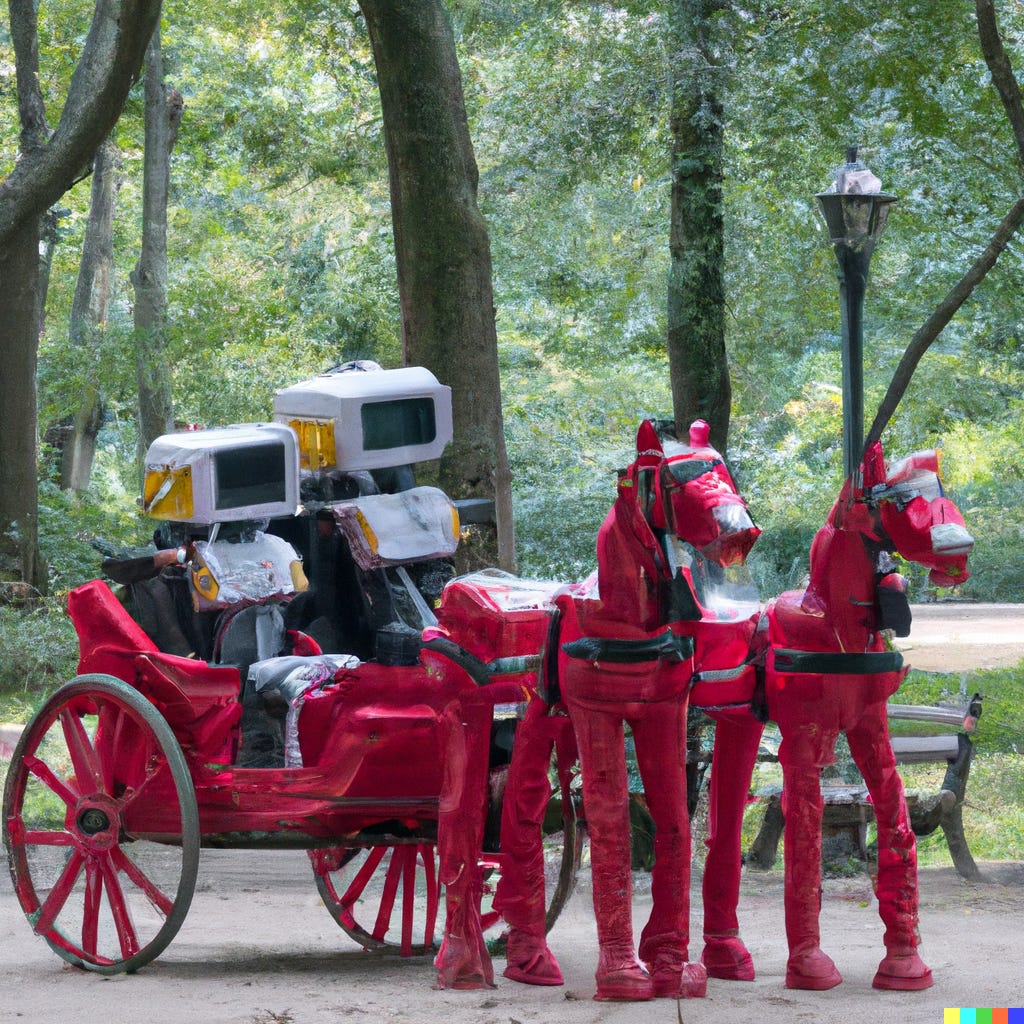Wanted: Robot fluffers. No experience necessary.
Will AI create more jobs than it destroys? We're about to find out.
Robots driving a horse-drawn carriage by DALL-E
The notion that AI is going to put people out of work isn't exactly original. A bunch of studies that came out a few years ago predicted that at least half of all jobs -- including professions like actor, teacher, therapist, and (yes) writer -- will be done far more cheaply and easily by machines by the middle of this century.
The counter argument (usually made by people with a vested interest in replacing humans to cut costs) goes like this: AI will create far more new jobs than it replaces.
Already we're seeing evidence of this. Apparently the rise of Generative AI has created a new category of job: AI Prompt Engineer. [1]
Sam Altman, the CEO of OpenAI who's going to make a trillion dollars licensing this technology to corporations, tweeted this recently:

(At least, we think he tweeted it. Maybe he told a machine to do it.)
In other words, AI engines won't just generate new stuff on their own. They require someone to get their dander up, so to speak. Someone to tickle their fancies and moisten their gussets. They need a fluffer. [2]
That's a relief. One new job down, 3,319,999,999 to go.
The fact is, new technology has always put people out of work. That's kind of the whole point. Remember when home appliances were marketed as "labor saving devices"? When someone says 'labor,' they usually mean people.
For example: At the end of the 19th century, there were a whole lot of horse breeders, carriage makers, buggy whip manufacturers, blacksmiths, and manure collectors congratulating themselves on their fine career choices. [3] A few decades later, not so much.
Of course, some of these jobs continue to exist. There are still people who drive a horse and buggy. Maybe a few dozen, most of them wearing silly hats and operating in and around NYC's Central Park. (Fun fact: Those horses are raised by the Amish. Insert your own joke here.)
On the other hand, think of all the jobs the automobile created: Assembly line workers, designers, engineers, sales people, mechanics, gas station attendants, traffic light manufacturers, chauffeurs, cabbies, race car drivers, parking valets, traffic cops, meter maids, toll collectors, and the homeless person who smears a greasy rag across your windshield at the stoplight and hits you up for $2.
Not to mention the oil and gas industry, and all those highways that needed to be built.
So there is some validity to that argument. Technology does invent new professions that didn't exist before. Cars have created millions of jobs and trillions in revenue. On the other hand, they've also played a major role in destroying the planet and hastening our eventual extinction. And they kill around 1.4 million people per year.
It turns out we would have been better off building more high-speed rail and redesigning cities to be pedestrian and bicycle friendly. But back then, were were all agog with the speed and convenience and newness of the "horseless carriage."
That's where we are with AI today. It's very likely that the Rise of the Machines will give birth to new kinds of work we haven't quite figured out yet, while also obliterating jobs that have been done by humans for millennia.
But unlike with the automobile, the transition to the robot economy isn't going to take decades. It will be fast and furious, and not in a Vin Diesel kind of way.
Some people, including the aforementioned Mr. Altman, are already anticipating this and calling for an "AI tax" that will siphon off some of the profits generated by labor-saving AI and provide a universal basic income [4] for people who've been cashiered by machines.
And that will in turn create yet more new jobs: Robot tax collectors, auditors, accountants, etc. Imagine an IRS run entirely by intelligent machines. That's not scary, right?
The algorithms giveth, and the algorithms taketh away. Just hope you're on the right side of that equation.
[1] A tip of the cap to Morning Tea House for sharing this with me.
[2] You'll just have to Google it.
[3] Maybe not the manure guy.
[4] $13,500 per person per anum, according to Altman. Almost enough to keep everyone in cat food for an entire year, if you don't buy the expensive kind.



Whose to say the robots won't eventually be self-fluffing, autoerotics...in any case, the U.S. love affair (obsession) with car culture is, of course, exceptional. We just saw this amazing documentary London Super Tunnel on PBS...so good.
https://www.youtube.com/watch?v=HpzF3OKBD1g
Uh-oh. I'm a Fancy Feast guy.